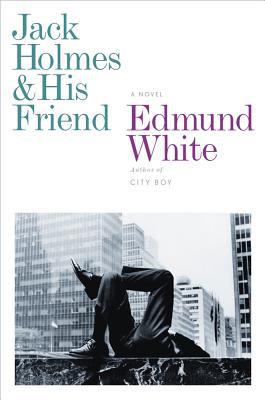 Jack Holmes & His Friend
Jack Holmes & His Friend
by Edmund White
Published by Bloomsbury USA
Published January 24, 2012
Fiction
400 pgs. • Find on Amazon.com
Reviewed by Stephen O. Murray
November 28, 2016.
Having just read City Boy, Edmund White’s memoir of the 1960s and ‘70s in Manhattan, the self-hating (as in internalized homophobia) Jack Holmes is clearly based on the author’s experience, graduating from the University of Michigan in 1962, where he majored in Chinese (art history in the case of Jack), moving to New York City, working for magazines, social-climbing, pining for a man with no interest in having sex with him, compulsively cruising for sex, etc.
The major difference is that Jack Holmes is an ultra-hung top. The object of his unrequited passion is a straight male coworker with bad skin, Will Wright, late of Princeton and from an impecunious though socially prominent Virginia family. Jack is content to write about business (OK, that’s a variation from the author’s beat, too). Will pubishes a novel that is crushed by a review in the New York Times that labels the whimsy “fey,” a kiss of death for the super-straight Will, who stops trying to write fiction and moves to the exurbs with a rich wife whom Jack introduced him to.
Jack also introduces Will to a sophisticated Italian woman, Pia, and facilitates their affair. And when Will “takes a vacation” form his wife and two difficult children, Jack houses him, though having a live-in male sex object of his own. Jack does not treat his “partners” well. Though fantasizing about a long-term relationship, he mostly maintains the libertine 4-F lifestyle.
Jack is the protagonist of the first third (-plus) of Jack Holmes & His Friend, though it is written in the third-person. This part of the book is a convincing tale of frustrated love for an impossible object while gracelessly “enduring” his homosexual desires (“he longed for a trapdoor beside the bed into which he could push his trick” once Jack ejaculates). The second third (-plus) is told in the first person by Will, commencing nine years later. I find the supposed reason for the break unconvincing, but Will is not the most reliable of narrators.
To me, Will seems unconvincingly fascinated by Jack and by thinking/talking about gay-straight differences. Though relating ambivalence about his marriage and about his affair with Pia, Will has a sort of obsession with comparing himself and his libertinage with Jack and Jack’s. I don’t think that even a straight guy fully aware that a gay guy is in love with him is credibly so preoccupied with his loving friend, and White’s attempt to get inside Will does not convince me. Moreover, the sex with Pia seems to be gay with a nominal female doing what she does to expand Will’s range of pleasures. (And his wife has a boy’s name: Alex… and suffers from Will’s remoteness rather as Jack does.)
There is a pat happy ending (or two?) with Jack having risen to the social elite and come to terms with being gay (multiple therapists and decades of contempt for “homosexuals” later). (This arc of shedding loathing for his gay desires is also basic to City Boy, and the “My Therapists” chapter of White’s memoir by topic, My Lives, and parallels Martin Duberman’s Cures.)
Two period details that I noticed rang false: The late news could not have been on at the same time as “What’s My Line?” and Woody Allen was not established as an icon of Jewishness in 1964.
©2016, Stephen O. Murray

